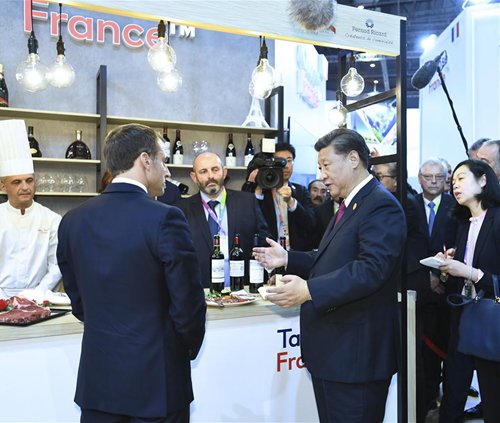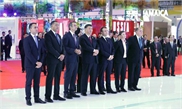
Accompanied by French President Emmanuel Macron, Chinese President Xi Jinping visits the French exhibition area at the second China International Import Expo (CIIE) in East China's Shanghai on November 5, 2019. Chinese President Xi Jinping, together with foreign leaders who are attending the second CIIE, toured the exhibitions after an opening ceremony Tuesday in Shanghai. (Xinhua/Xie Huanchi)
French President Emmanuel Macron, who is on a state visit to China, became the first leader of a major Western country to attend the 2019 China International Import Expo (CIIE) and was accorded a warm reception by China.
Obviously the main purpose of Macron's visit is to expand the market for French companies in China, and it is clear that he does not want anything to come in the way of this goal.
Continuously strengthening economic cooperation will be the most important link in China-France and China-EU relations, which is due to the common interests of both sides
However, sections of public opinion in France and Europe are very concerned about whether Macron will raise the issue of human rights in some way before Chinese host during his visit.
Some Europeans' desire to ask their leaders to talk about so-called human rights issues on their visit to China can be described as "obsessive-compulsive disorder". Those people obviously know that there are stark political differences between China and Europe and Europeans have no power to influence China.
Accusing China of so-called human rights violations has almost become an awkward and reluctant political show that is put up mainly for Europeans instead of the Chinese.
Some Europeans have convoluted mind-set to think that talking about human rights to China can help them recover their lost self-esteem and ease their sense of loss and anxiety in the face of a rising China.
Today, China has experienced tremendous development. In the past, it was mainly European tourists coming to China, but not the other way round. Now there are more Chinese tourists travelling to Europe than Europeans coming to China.
However, those people refuse to see the progress China has made on issues concerning human rights, and they feel better in denouncing the East Asian nation. It is pathetic that due to their stereotyped thinking they have lost the ability to understand the improvement such a huge society has made in history.
This emotional and unrealistic attitude toward China cannot stop Europe pursuing its interests, nor can it decide where Europe's interests should go. The European leaders bring a long list of economic and trade needs every time they come to China, which indicates that they would not take the vanity of some people from their own countries or other Europeans as their main aim of visiting China. They have to remain rational and sober as leaders.
After all, the relationship between China and Europe as a whole has developed well, and the one between China and France especially well. Europe needs greater decisiveness and should first understand the current situation more accurately and see the general trend clearly. If it cannot establish a thorough and realistic perception of China, Europe will unavoidably get a distorted view of the world.
China is a partner not only in the further development of France but also Europe. China and Europe should not accuse each other or be wary of each other's intentions, but need to respect and support their relations. There are too many areas in which they can strengthen cooperation.
The US-launched trade war has spoiled the global economic environment, but offers opportunities for European countries to participate more actively in China's economy. Macron showing up at CIIE at the right time reflects a keen sense of him and France.



